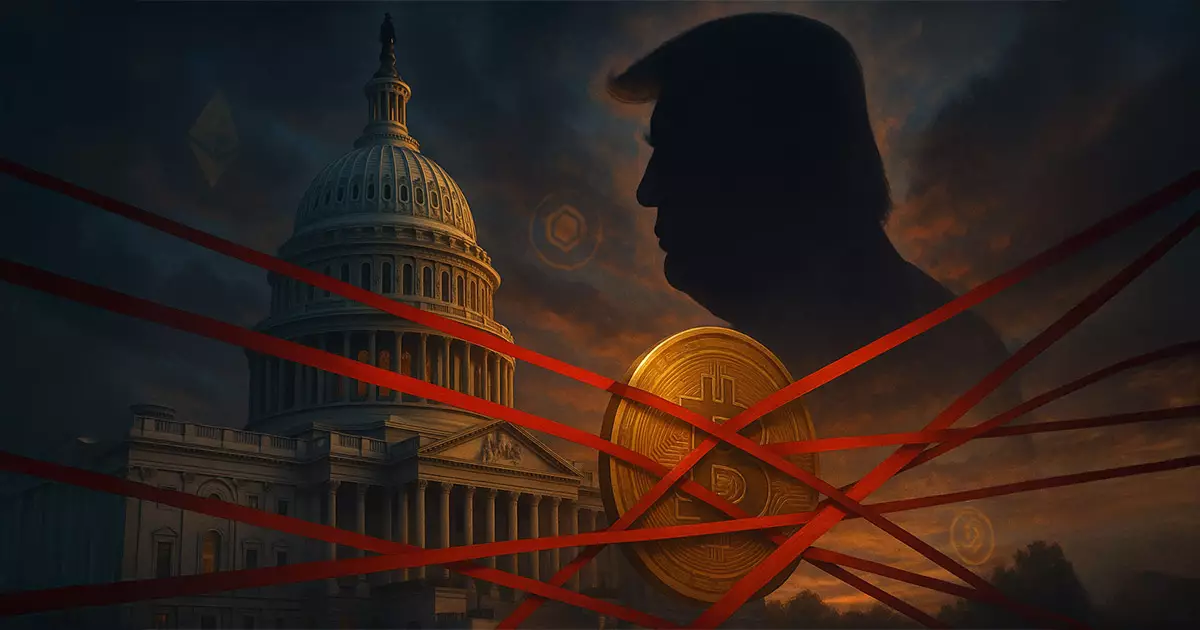The ever-evolving landscape of cryptocurrency regulation in the United States is facing unprecedented hurdles, largely due to the ethical fog surrounding former President Donald Trump’s personal crypto activities. The GENIUS Act, intended to solidify stablecoin legislation and offer clear-cut regulatory frameworks for digital currencies, came dangerously close to derailing recently. Key players in the fintech world, like Ryan Gilbert of Launchpad Capital, have voiced their frustrations, stating that “personal business is getting in the way of good policy.” In an era where innovative financial solutions are sorely needed, it’s disheartening to witness such a potent opportunity being overshadowed by self-serving interests.
It’s illuminating to consider why lawmakers were hesitant regarding the GENIUS Act. This proposed legislation has the potential to streamline regulations, allowing cryptocurrencies to flourish in a secure environment. However, senators are now forced to grapple with gauging the fallout from Trump’s crypto businesses. With a vote that teetered on a razor’s edge at 48-49, one can’t help but wonder if political ideologies are being bent and compromised by perceived corruption and profit-driven motives.
Trump’s Undeniable Profit Motive
The narrative is alarming: Trump’s association with the memecoin $TRUMP, launched just before his historic presidency, has spiraled into a tale of financial gain reminiscent of a blockbuster film script. While the memecoin initially surged, it plummeted shortly thereafter, erasing significant investments from everyday individuals while enriching Trump’s companies significantly. According to reports, these firms reaped $100 million in trading fees in a matter of weeks. Illustratively, Trump’s ventures seem not only to capitalize on his political tenure but also to exploit the goodwill of American citizens, turning the notion of public service into a mere façade for profit.
Additionally, revelations suggest that Trump’s properties controlled a staggering 80% of the memecoin’s circulating supply, enhancing the perception of conflict of interest. A government figure profiting off the same financial instruments he has the potential to regulate highlights glaring ethical inconsistencies. What kind of confidence can citizens have in policymakers who act not as guardians of the public interest, but as opportunists feeding off financial boons?
The Perils of Regulatory Capture
As accusations mount against Trump’s crypto initiatives, there is a palpable fear that these ventures can serve as vehicles for darker practices. Discussions around influence peddling, bribery, and regulatory capture are fueling outrage from both sides of the aisle. Critics like Representative Stephen Lynch assert that Trump has reportedly accumulated around $2.9 billion from his cryptocurrency ventures, which raises immediate concerns about accountability and transparency.
Moreover, Pakistan lawmakers recently introduced the End Crypto Corruption Act, reflecting a growing urgency to stymie such ethically challenging behavior. The act aims to prevent members of Congress and their families from endorsing crypto assets, an important step in restoring trust in an already shaky political climate. The ongoing turmoil reveals troubling parallels between political corruption and commercial interests, creating an environment rife with suspicion.
Public Sentiment and the Quest for Integrity
The growing sentiment among citizens is one of palpable frustration and disillusionment. Public figures like Congresswoman Maxine Waters have articulated the feelings of many in their insistence that Trump has run “a campaign to put more money in the pockets of Americans”—only to find that it’s his own pockets being lined instead. The sense of betrayal from those in positions of power is evident; it begs a question of integrity. Are policymakers predominantly motivated by serving the public good, or is lining their own pockets the priority?
If lawmakers continue to sidestep ethical dilemmas in favor of political expediency, the integrity of the legislative process will be compromised. The call for accountability in this facet of crypto legislation is not merely an ethical endeavor but a crucial component in restoring trust in governmental institutions. As the political discourse evolves, it becomes more evident that these conflicts of interest risk tainting public perception and achieving meaningful regulatory advancements in the crypto realm.
Looking Ahead: A Divided Future
Despite the dark clouds looming over Trump’s crypto-associated ventures, there’s a sliver of optimism reflected in the bipartisan talks surrounding the GENIUS Act. Prominent senators have already commenced negotiations again, aiming to revitalize the bill after its narrow defeat. Yet, the question remains—will this proposed legislation pave the way for a safer, more regulated cryptocurrency ecosystem, or will it crumble under the weight of personal enrichment and ethical misconduct?
This battlefield between regulation and greed will dictate the future trajectory of U.S. crypto policy. As long as conflicts of interest linger, the integrity of proposed frameworks will remain susceptible to a potent mixture of ambition and avarice.


Leave a Reply